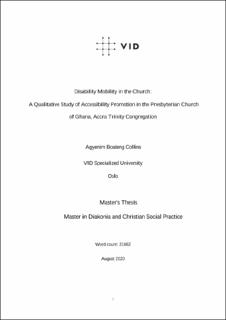| dc.description.abstract | The research was set to explore the experiences of Persons with Disabilities (PWDs) in the Presbyterian Church of Ghana. Specifically, the study highlighted the doctrinal, structural, institutional, transport, financial and regulatory impairments encountered by PWDs in their quest to be fully involved in the worship activities of the Church. The objective is to explore accessibility to PWDs in the Christian religious organization. Using the qualitative research method, four persons with disabilities, comprising participants with varying education and economic backgrounds, and three leaders of the Presbyterian Church in the Ga Ministry were selected to participate in the research. In-depth interviews were used to collect data, and the Braun and Clarke's (2006) thematic analysis was then employed for data analysis. Only PWDs who are domiciled in the Accra metropolis and have worship services with the Presbyterian Church of Ghana were selected to be part of this research. The result of the study indicates that PWDs in the Ga Presbytery find it difficult navigating church facilities in the due to the unfriendly nature of the architectural designs of pavements and the location of consultation rooms and other church offices on storey buildings. It was also revealed that transportation glitches have significantly accounted for the reluctance of PWDs in the district to go to the Church. Finally, discrimination against PWDs is pervasive in the Church, often dissuading victims from going back to the hospital. This was evident in the exclusion of PWDs from decision-making processes and leadership positions, and the content of sermons preached by pastors in the Church. However, having recognized the problem, the Presbyterian Church has developed a Policy on Disability to protect the welfare of PWDs in the Church. Based on the findings mentioned above, the research recommends more stringent monitoring of church facilities to ensure that they comply with the provisions of the Disability Act 2006 (Act 715). Owners of religious organizations must ensure that their employees are compliant with all regulations of the Disability Act and the innate worth and dignity of PWDs duly respected. Most importantly, the government of Ghana must endeavour to educate the public on the provisions of the Disability Act across all institutions, particularly in the religious sector, to prevent the inhumane treatments meted out to PWDs by congregants. | en_US |
